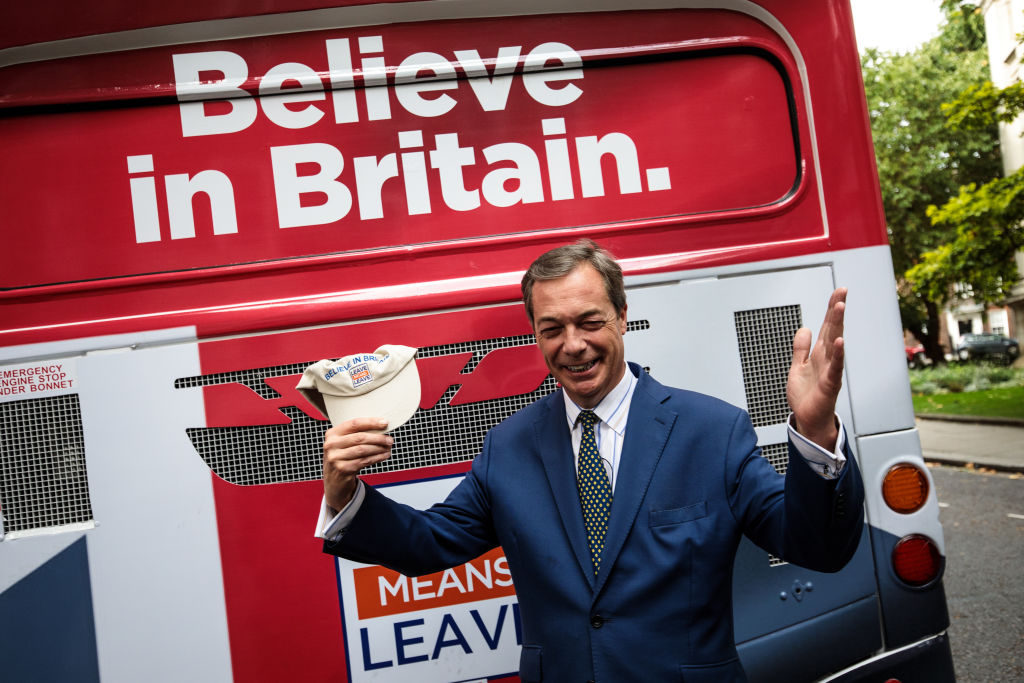This year’s Ukip conference in Birmingham has only just started but already trouble is breaking out. A row that has been bubbling within the party since it was first founded a generation ago is coming to the surface thanks to a clash between the party’s current leader, Gerard Batten, and its most famous one, Nigel Farage.
Farage, no stranger to chucking rocks from the sidelines, has criticised the direction in which Ukip is now travelling. The former Ukip leader warned that the party risks ‘utter marginalisation’ if it cosies up to the far-right. The catalyst for his comments is Batten’s bid to recruit former English Defence League leader Tommy Robinson. Farage’s assessment of the party was withering: ”I’m less than impressed with the current direction in which we’re going. It devalues, undermines many of the incredible achievements,’ he said.
Batten hit back this morning, pointing out that a man who praises Donald Trump and speaks at rallies for the far-right Alternative for Germany party is “throwing stones in a glass house.” Batten, MEP for London since 2004, is one of the few people in Ukip who can pull rank on Farage when it comes to length of service. The former BT salesman was in the room at the London School of Economics on September 3, 1993, when the United Kingdom Independence Party was officially formed. Farage was on holiday at the time, and so missed the meeting.
Yet it is Farage, of course, rather than Batten, who became the party’s leading figure, and ensured that Ukip changed the course of British history. While the former City trader was plotting how to orchestrate the UK’s exit from the EU, Batten had his eye on tackling the rise of Islamism in Britain. He produced a charter in 2006 calling for Muslims to sign a document promising not to become terrorists; in 2010 he also said no new mosques should be built in Europe.
Farage clearly thinks very little of Batten, and despite their many years as MEPs together, Batten only gets five very brief mentions in his 2010 autobiography.
As Farage embarked on his attempt to de-toxify the party from 2013 onwards, Batten was kept well away from the airwaves. Despite being the party’s London Mayoral candidate in 2008, chief whip in the European Parliament form 2009 to 2014, and even coming second in the 2009 leadership election, Batten was treated more as an inconvenience than a senior figure in the party.
Batten was hardly enamoured with Farage either. While he appreciated the success coming Ukip’s way, he regularly complained the tactics used were too focused on Farage, and not enough on the party, according to a well-placed source. Now Batten is in charge, and he is seemingly determined to remake the party in his own image.
But Farage is not completely innocent in Ukip’s shift to the far-right. More moderate voices in the party, such as Suzanne Evans and Steven Woolfe, were seen as threats, not heirs, when Farage was leader, and frequently found themselves on Ukip’s naughty step.
There was also no succession plan in place to ensure that once Farage finally stood down as leader the tactics he had used to attract 3.9million voters in the 2015 general election would still be adhered to.
When it comes to party members, Farage is still an immensely respected figure, but there is a growing sense that he abandoned Ukip in its time of need. He rarely goes to party conferences these days, and didn’t turn up to the Emergency General Meeting held earlier this year which saw Henry Bolton kicked out as leader. It’s all very well carping from the sidelines, but why isn’t he rolling up his sleeves and getting involved?
Farage looks like a man who is orchestrating an exit, and is more concerned with his battle bus tours with Brexiteer Tories than once again leading the People’s Army he helped to recruit.






Comments